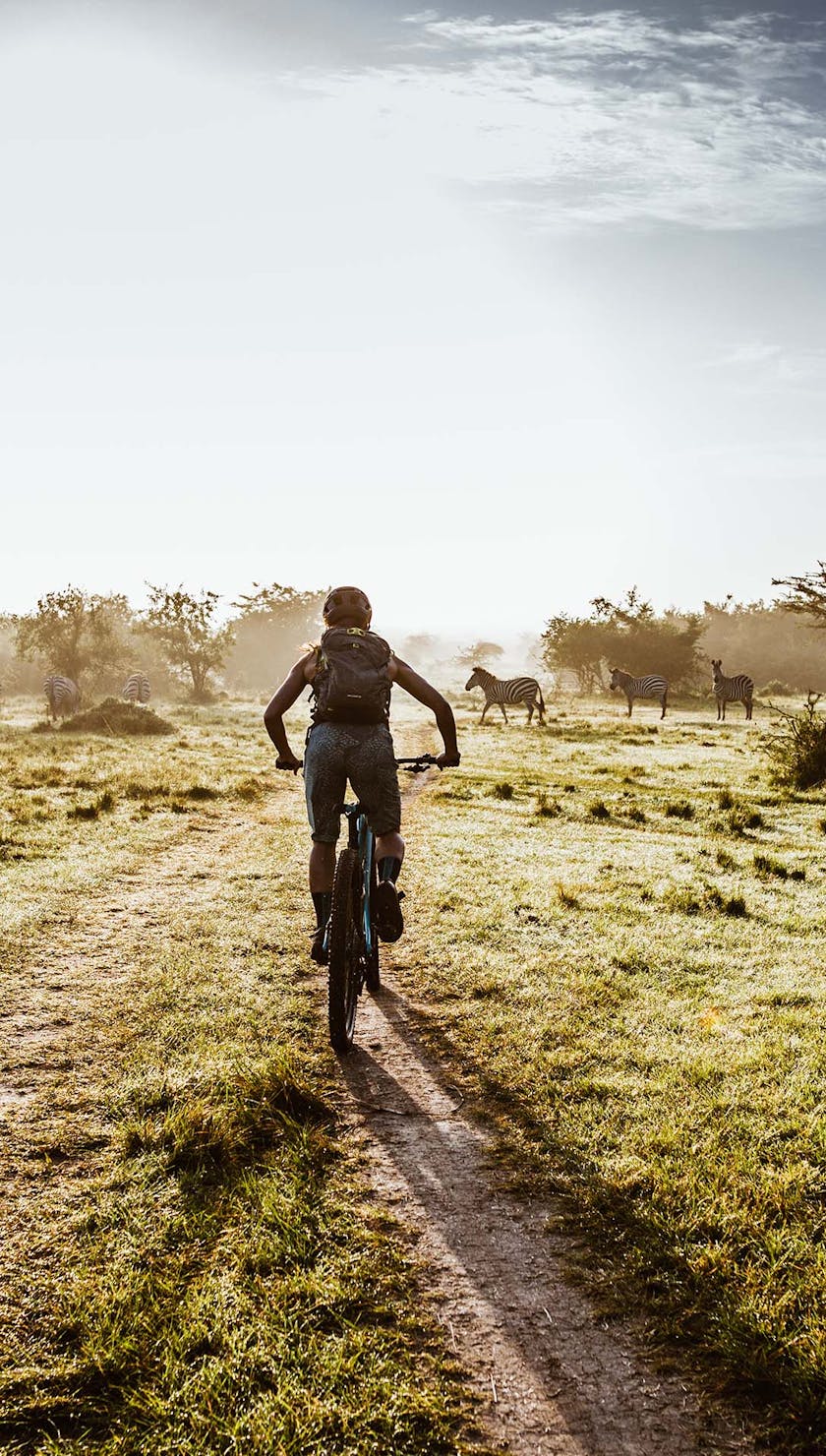
State of Flow
My first experience putting rubber to singletrack came 13 years ago. I was 21 and had just lost my first love, Steve, to an aggressive non-Hodgkin lymphoma — a ruthless cancer he fought for nearly two years. The loss left me confused. To distract myself, I turned to academic research at the University of Michigan in the medical field of vascular surgery. Veins and arteries were much easier to understand than the pain I was feeling. I needed a morale boost. Two convincing colleagues pulled me to the Potawatomi trail system in Pinckney, Michigan and set me up on a steel hardtail. From that first ride, life as I knew it changed.
The trails were places where my brain could turn off and my mind would turn on.
I found myself driving all over Michigan to find new trails, pushing my bike up every hill and crashing around every corner and every water-slick root I could find. The trails were places where my brain could turn off and my mind would turn on. Mountain biking saved me. It became my healthy place. Bikes have also given me the energy to chase a career in pathology.
Living in Durango and commuting to the hospital via singletrack, has deeply intertwined my love of science with riding my bike now, too. As a pathologists’ assistant, I dissect, assess and provide essential information to classify cancers and their involvement to the surrounding tissue, as well as aid in the diagnosing of other nonneoplastic diseases. My experience losing Steve drives me to be an empathetic advocate for patients. Accurate and thorough results drive my sense of purpose for both my life and my medical career. And helping people receive the best treatment options by having a complete diagnosis is rewarding and fulfilling.
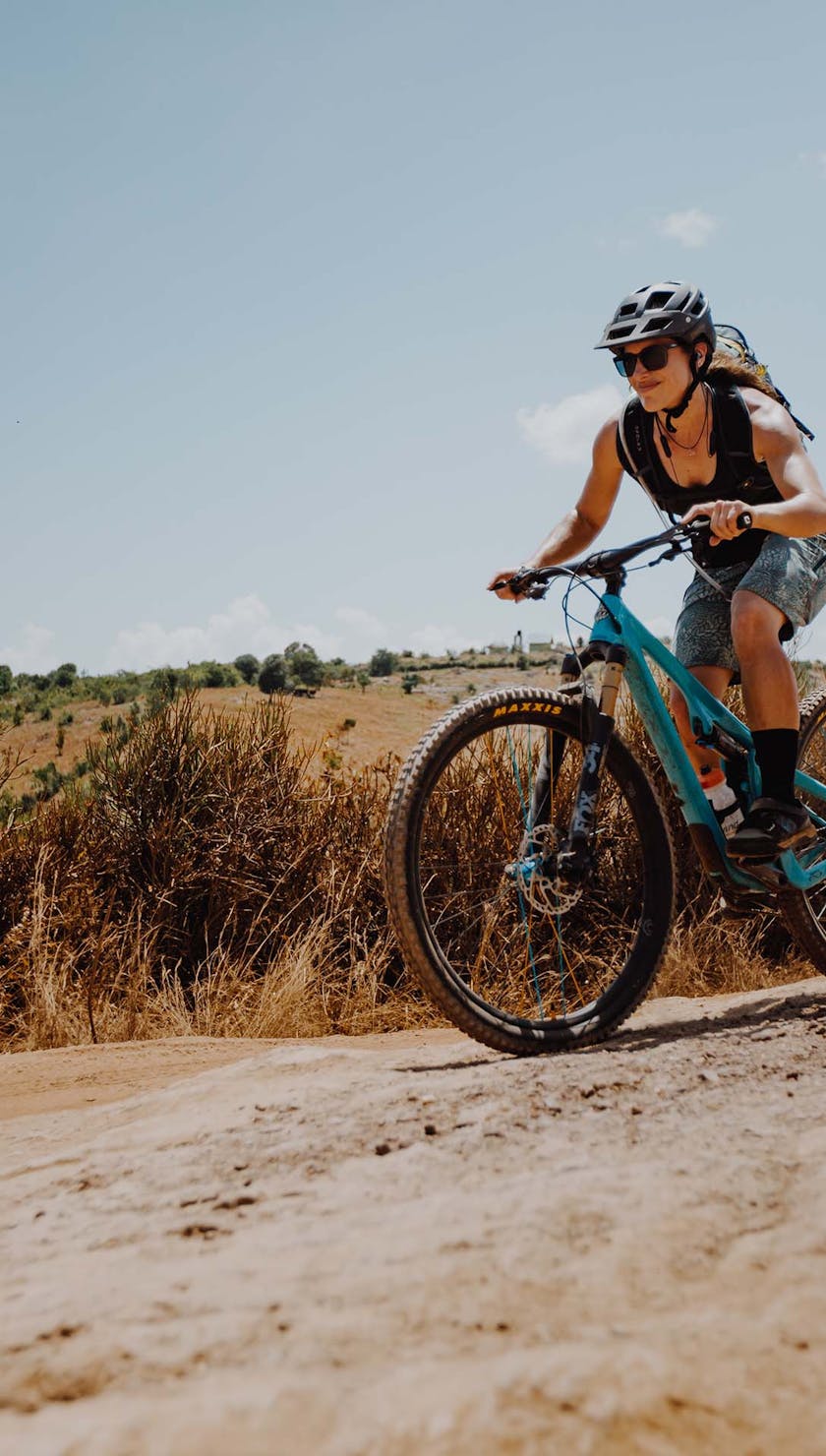
In 2016, I found my mind drifting to deeper dreams of giving back. I decided to volunteer with a global health pathology project in Haiti. The project was through an NGO whose mission was to start a remote pathology laboratory with the samples being processed in Haiti, and read by volunteer pathologists from around the world.
The physicians I was hired to train were on strike. There wasn’t a steady supply of electricity to the “lab” area that I was tasked to organize. There was no running water. And the surgery suite left the doctors without appropriate protection from transmittable diseases. I left Haiti scratching my head.
When I arrived in Haiti there was no infrastructure, and extremely limited organization for what I was going down to help with. I spent the majority of my time struggling with a translator, trying to retrieve equipment that was being held up at customs in Port-au-Prince. The physicians I was hired to train were on strike. There wasn’t a steady supply of electricity to the “lab” area that I was tasked to organize. There was no running water. And the surgery suite left the doctors without appropriate protection from transmittable diseases. I left Haiti scratching my head.
I spent the next few months reading books and research papers on global health issues, and on my morning commutes I pondered how to improve upon what I experienced in Haiti. I decided to start my own charity that would educate and train developing communities in sustainable pathology practices that were true to science and performed under proper and safe work environments. This would become Path of Logic.
To this day, I use my Yeti bike to raise the money needed to support and fund Path of Logic.
I was a new ambassador with Yeti when I started Path of Logic. We began working together after I expressed my love of my SB-95. I ran an idea by Team Manager, Damion Smith, asking if I could sell the bike Yeti had given me and donate the funds to Path of Logic. Charity’s need funding and I never wanted my time swallowed up by fundraising — knocking on doors, explaining the importance of cancer diagnostics in the developing world, etc. I was stoked. I had found a funding model! Each year I’d plan to host one fundraising event to engage the outdoor industry by auctioning off my bike, plus as much gear as I could get donated from collaborating companies (such as Osprey, Patagonia and Tailwind Nutrition) and use the money to fund the organization. To this day, I use my Yeti bike to raise the money needed to support and fund Path of Logic.
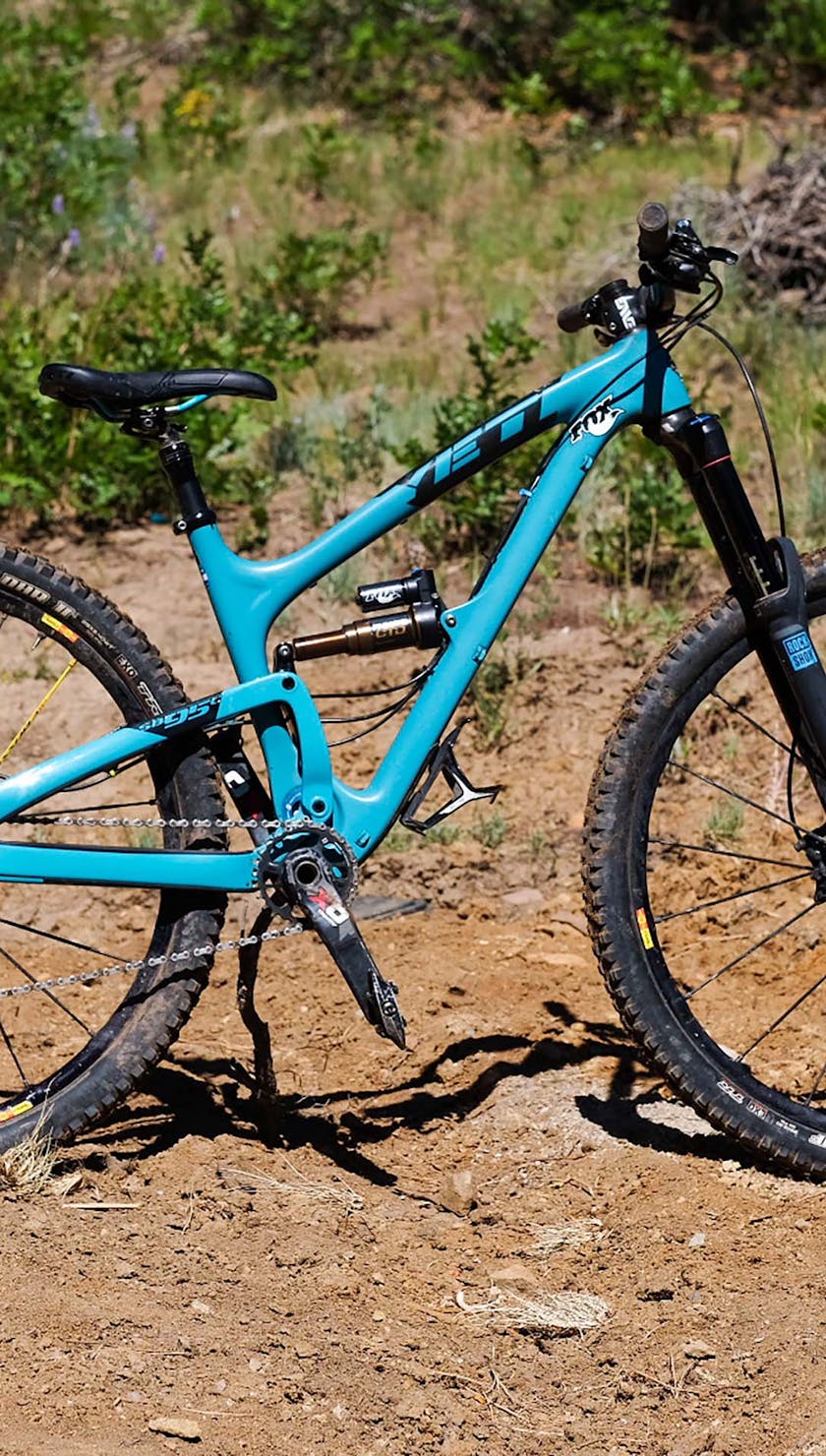
Our Path of Logic program is always evolving, building upon what originally started as a simple process of teaching dissection procedures. Each year, we identify areas of the laboratory that need updating, and as a team make plans to address them. It’s never easy. The geo-political and cultural barriers are immense and something as small as coordinating a meeting with the general surgery team can prompt multiple meetings and conversations about objectives. Most people don’t carry phones or regularly check emails — tracking down a person for a meeting is a feat on its own.
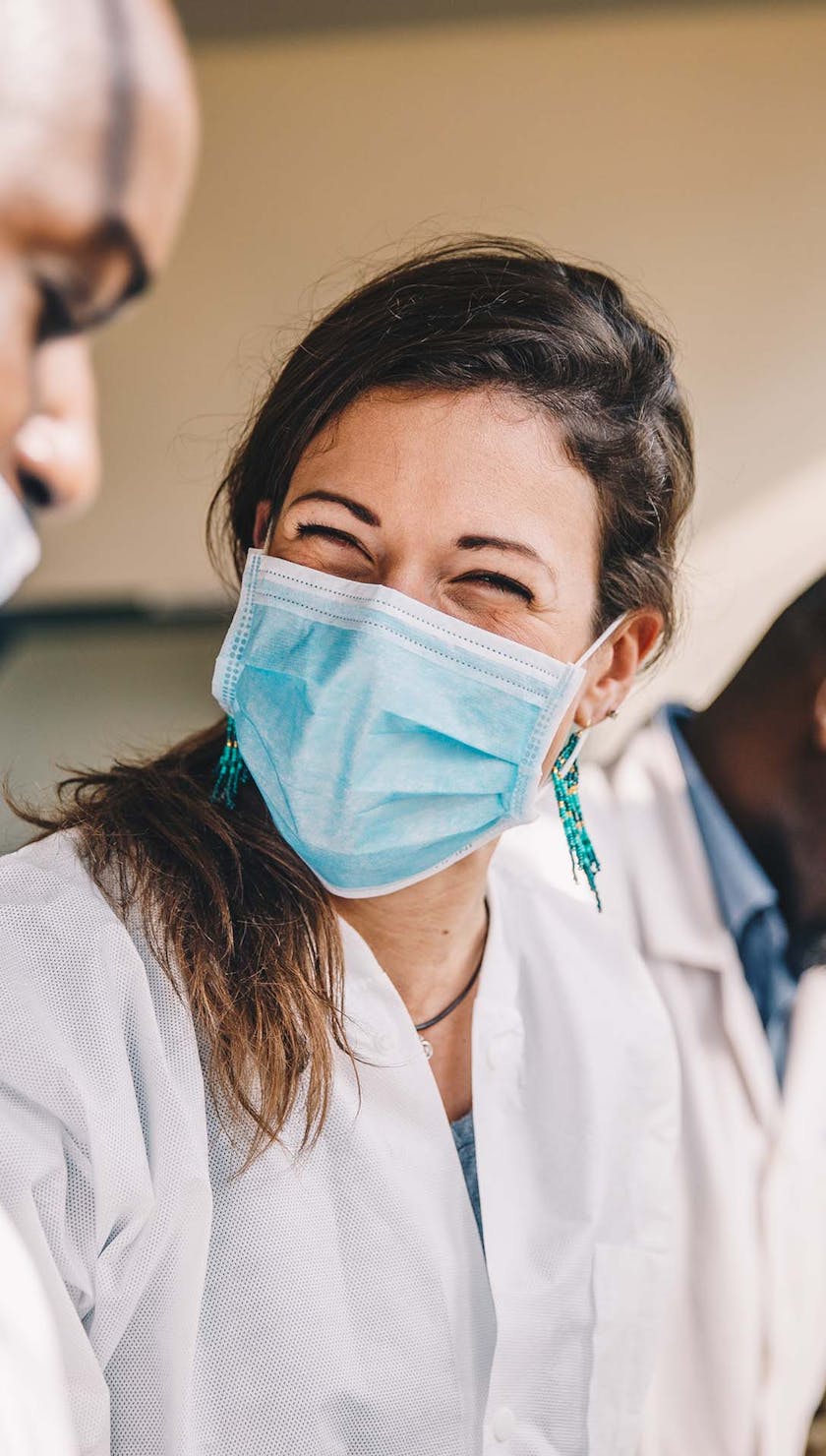
I’ve found trust to be essential and change to come slowly.
From a data collection standpoint it was very difficult to ‘show’ and track the issues we were facing. Records were lost frequently making it difficult to clearly demonstrate our goals to the Mbarara hospital administration, who can shift government funding from the ministry of health to different areas of the hospital. Currently, the ministry of health does not support the pathology department. I’ve found trust to be essential and change to come slowly. Often, processes are so slow that projects are started yet never finished, making the locals skeptical of motives and weary of volunteers’ “big ideas.” It’s exhausting work, and many practitioners burn out without gratification.


Biking was the way for me to relax, and experience the country without feeling like a tourist, staring into a culture from inside a vehicle. On my bike I’d be right there on the streets with the locals — exposed.
After my first trip to Uganda, I knew I needed to establish a strong sense of trust with the community I was serving. I also knew that meant my bike needed to be with me. Biking was the way for me to relax, and experience the country without feeling like a tourist, staring into a culture from inside a vehicle. On my bike I’d be right there on the streets with the locals — exposed. I craved to be in a state of flow in Uganda.
At the same time, MPOWERD Inc. serendipitously asked if I’d be interested in distributing solar lights through the country. I was introduced to their products after a colleague in Durango gave me a Luci Lamp for my trip to Haiti — the house I was staying in didn’t have electricity. I was elated at the opportunity to bring the Luci Lamps to villages without electricity. In pathology, I have limited interactions with patients and locals. Something as basic as distributing a light not only gave me an opportunity to connect with community members, it allowed me to experience the culture and positively impact peoples lives.
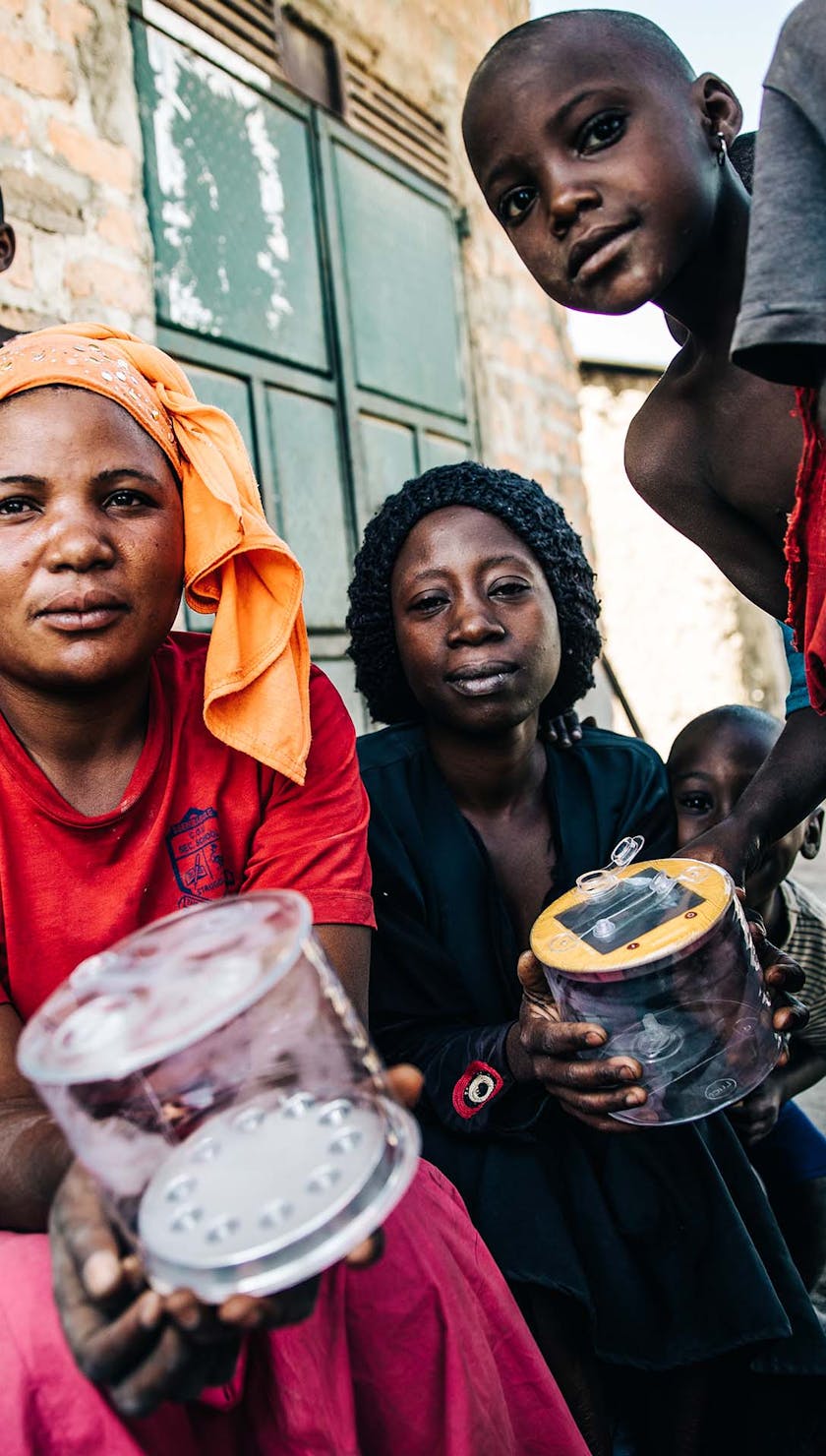
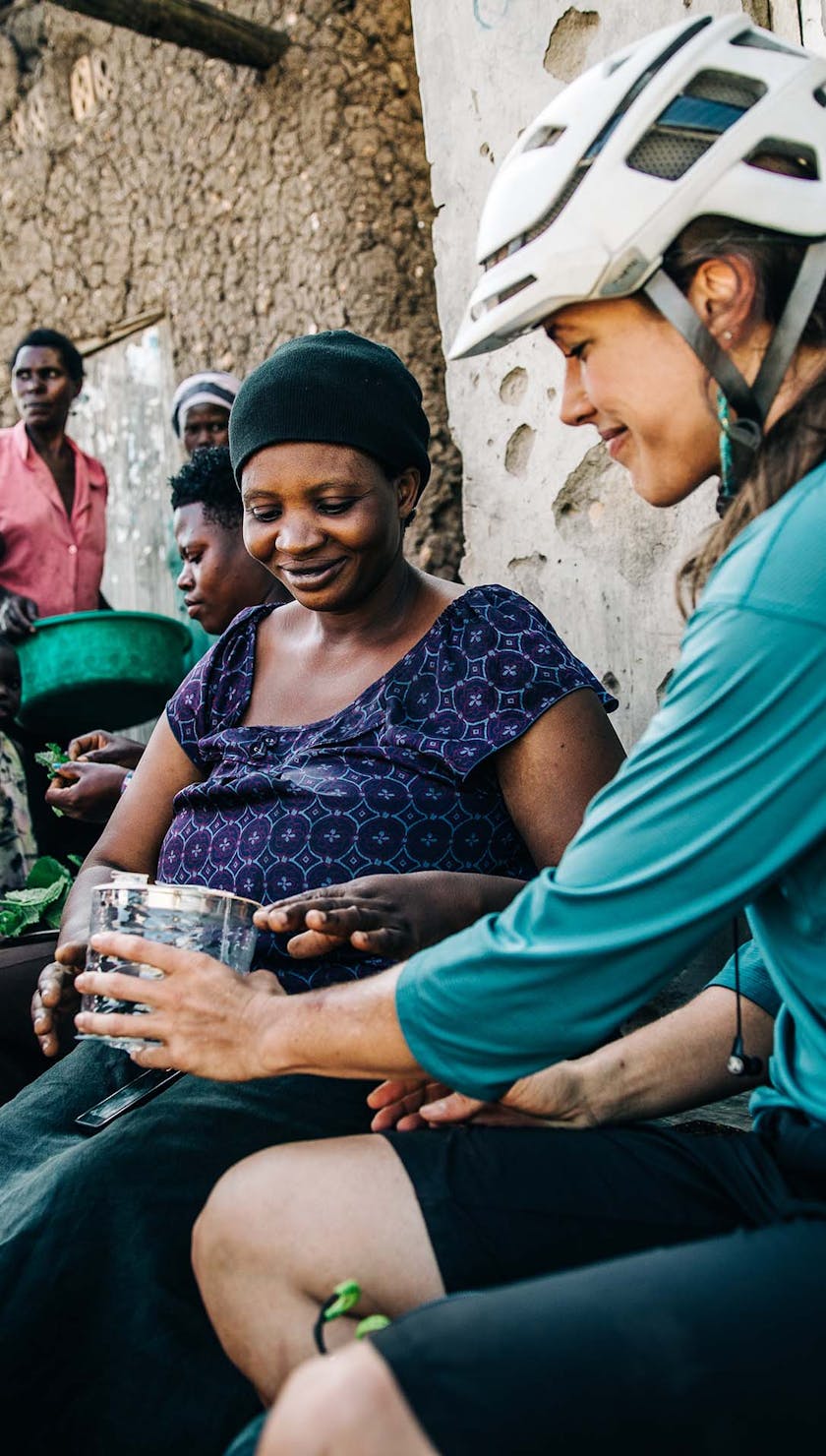
For my first bike trip through Uganda, I wanted to ride the dirt roads from Mbarara to the border of the Democratic Republic of the Congo (DRC), through Bwindi’s Impenetrable Forest and end up at the gorgeous, island spotted waters of Lake Bunyonyi. The ride would be about 250 miles and pass through some of the more remote mountain villages of southwest Uganda. The days were long and hot. Uganda is located on the equator and the sun is intense. I also happened to be there on the cusp of the rainy season, so the weather was drenchingly humid. A driving service accompanied me along the way, setting up check point times at the villages I wanted to visit and acted as my translator. I was loaded up with Luci Lamps in my Osprey pack and stopped frequently to distribute the lights to small villages on my way to my next checkpoint.


When I was on my bike they had time to process that I was alone and out of place. I didn’t startle or frighten them and they would approach me out of shear curiosity. I learned my bike was essential to those beautiful moments I spent playing and getting to know the locals.
The kids loved interacting with me while I was on the bike. As I made my way through the remote villages, children would run out of their homes giggling, pointing, and saying, “Mzungu, Mzungu!” which is Bantu for white person. In one of the Katete villages I visited, I learned that women didn’t ride bikes in Uganda so to see a female Mzungu, solo on a bike was quite the sight! Being on a bike was an experience I quickly learned to love and appreciate. When I’d stop to talk lights, the children trusted that I was safe because I was exposed, instead of hidden away in some foreign vehicle. When I was on my bike they had time to process that I was alone and out of place. I didn’t startle or frighten them and they would approach me out of shear curiosity. I learned my bike was essential to those beautiful moments I spent playing and getting to know the locals. This became apparent the following year on a bike route that included Queen Elizabeth National Park.
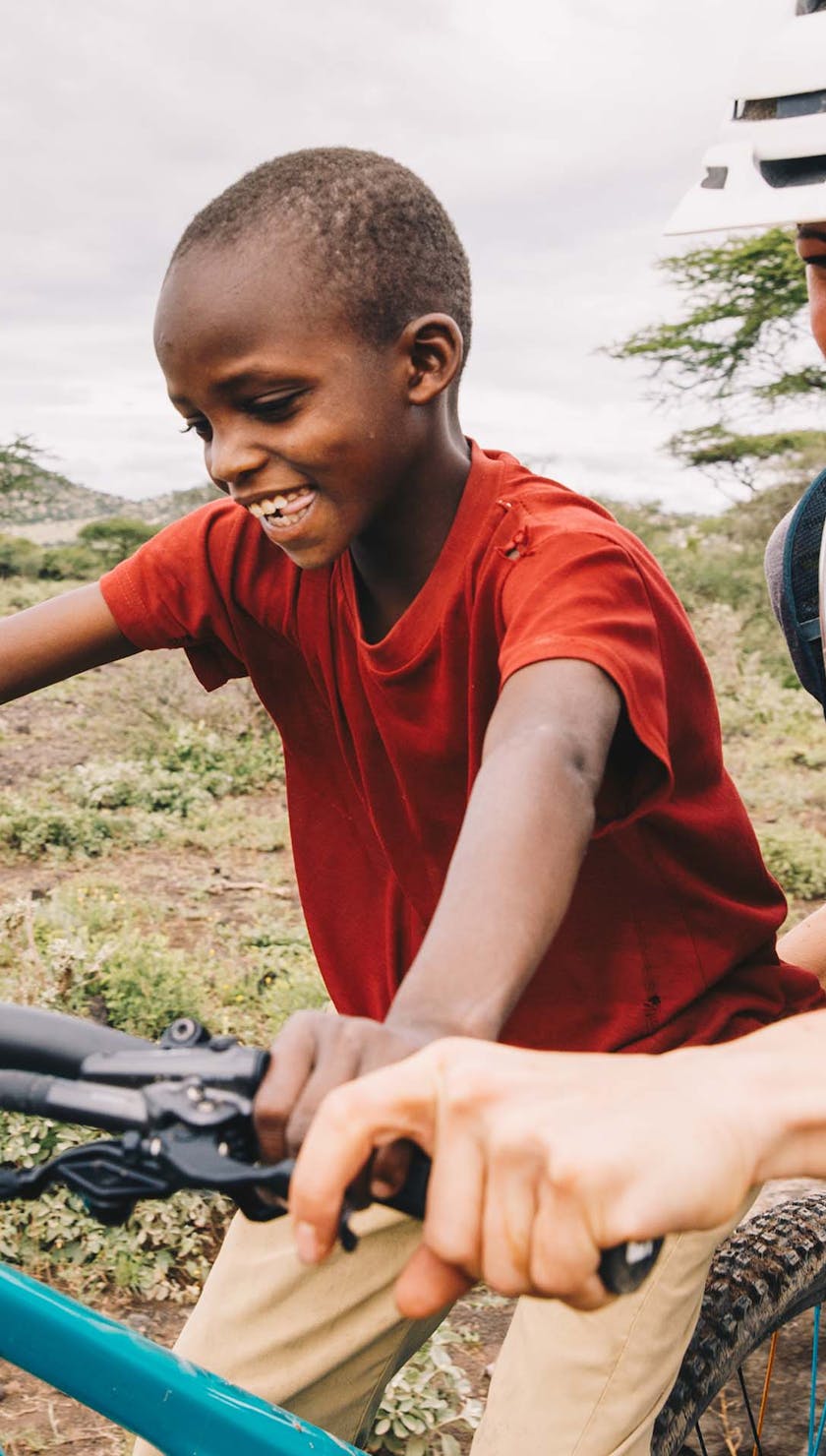
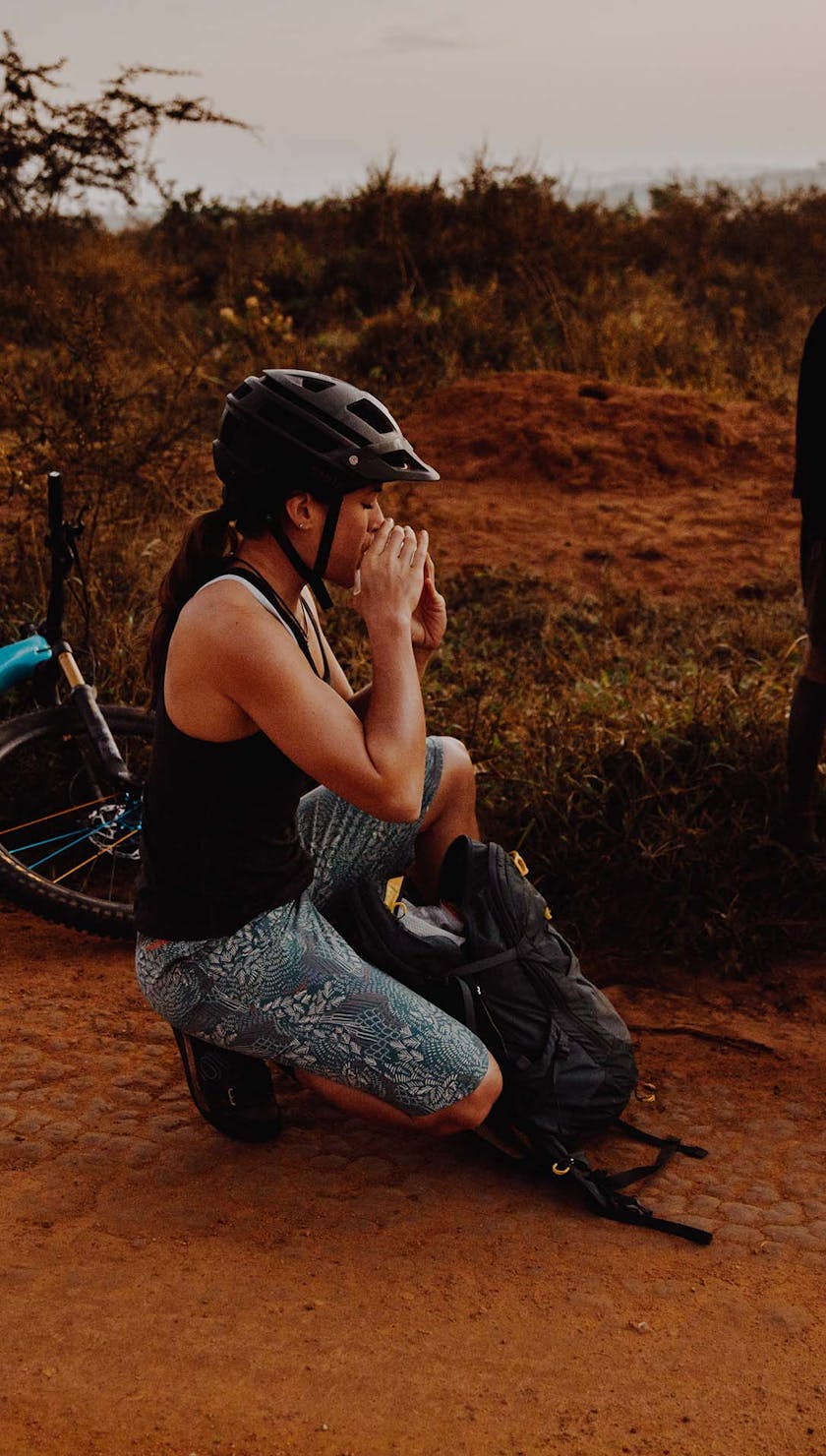
That powerful lesson has stuck with me. Not only did my bike allow me to connect with the land, but that it was a powerful symbol of trust, and very personal way to connect with the people.
Although becoming increasingly rare, violent disputes occur along the shared border of Uganda and D.R.C. specifically, in the area of Lake Edward, a small body of water in the Virunga National park — Africa’s oldest. Decades of conflict have plagued the lake area that runs between southwest Uganda and northwest D.R.C. In 2019 a kidnapping occurred just days before my bike trip to Ishasha, the border city where I planned to stay the second night of my trip. It was recommended to me I should avoid riding through Ishasha, but I was uncomfortable changing my route at the last minute without adequate planning. We stuck to the original plan, but as a precautionary measure decided to load me and my bike in a van and drive east of Ishasha to a safer region where I would start riding again. Along the way I asked the translator to stop the van so I could distribute lights to a small village. There were two young girls walking hand-in-hand. As they saw me exit the van they ran fearfully back inside of their huts. Unlike my experience in the Katete villages, their curiosity was replaced with fear. I did not return to the van. That powerful lesson has stuck with me. Not only did my bike allow me to connect with the land, but that it was a powerful symbol of trust, and very personal way to connect with the people.


Over the years my pathology work at Path of Logic has grown significantly. While I still teach and focus on general lab process improvements, I’ve taken on more responsibilities including my largest contribution to the healthcare system — improving the faulty internal tracking system for cases and results.
In 2015, a pathologist from the Henry Ford Hospital determined that, on average, it took 47 days for a patient in Uganda to receive results after surgery. A system needed to be created that could track cases, generate a pathology report and create a repository for others to easily conduct and mange research efforts. I hired a software engineer to create the system. We’re more than a year into using the new tracking system and case turn-around-times have decreased from 47 days to 15. The system also enables simple collection of epidemiological data, shedding new light on the importance of cancer diagnostics for the health of the community by showing its prevalence in curable cancers. The work we’ve done will lead to a healthier community with more lives saved and add more resources to continually improve the healthcare system in Uganda.
When I look back on the time spent riding and developing pathology programs in Uganda, I find my thoughts drifting to the personal connections I’ve made. I couldn’t have predicted that the hopelessness I felt with Steve’s death in 2007 would transform to helping people in Uganda. I’ve spent hours reflecting from the saddle of my bike about the small moments of exchanging smiles and hugs, or the excitement of children experiencing curiosity while shyly accepting a Luci Lamp. All of it has given me the energy to come back year after year.
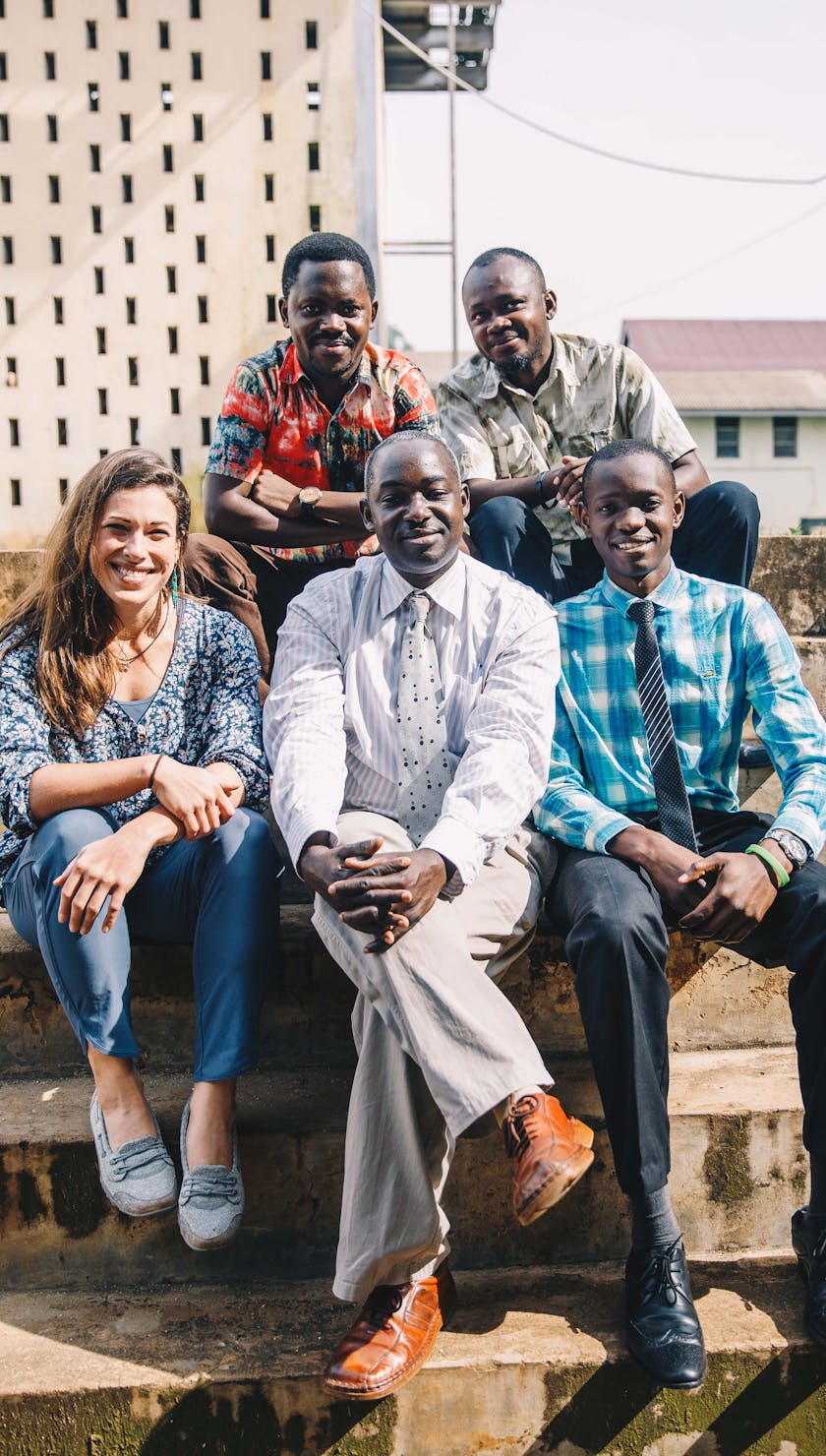
The balance and state of flow I find in Uganda will keep me coming back year after year. I won’t burn out.
I’ve ridden my bike so far around southwest Uganda that I’ve visited nearly the entire catchment area that the Mbarara referral hospital serves. I’ve been lost and had run-ins with primates, zebras, and other wildlife that stopped me in my tracks. My bike has given me the energy I needed when I needed it most. Provided the funding to set up effective pathology improvements in a developing country and most importantly, it’s been a medium for sincere human connection. Before leaving Uganda this last time, my fourth visit, one of the medical residents, Mitala, told me I needed a Bantu name. He suggested it should be Subi, the Bantu name for hope. The balance and state of flow I find in Uganda will keep me coming back year after year. I won’t burn out.

